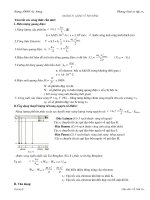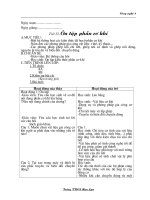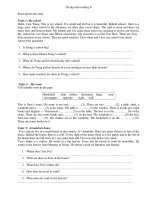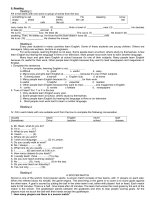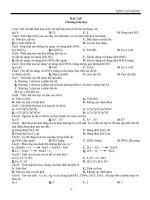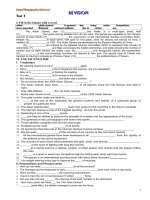ON TAP PHAN READING UNIT9-16LOP10
Bạn đang xem bản rút gọn của tài liệu. Xem và tải ngay bản đầy đủ của tài liệu tại đây (3.56 MB, 34 trang )
Greek “Pragma”, meaning deed
Pragmatic: practical or realistic
Pragmatics: the field of enquiry that deals
with how language can be used to do things
and mean things in the real-world situation
Jenny Thomas: the study of meaning in
interaction
Speaker’s meaning
Utterance interpretation
Speech acts: when we say something, we are
always doing something
Austin’s three-part framework
How to work out the illocutionary force?
Examples:
The relation of form to function is:
Not one-to-one
But many-to-many
Still a PROBLEM
E.g.: the use of tag questions by women
There is a general idea that people involved in
a conversation will co-operate with each other.
Paul Grice:
When people interact with one another, a
“co-operative principle” is in force.
Make your contribution such as is required, at the
stage at which it occurs, by the accepted purpose
or direction of the talk exchange in which you are
engaged. (Grice 1975:45)
In other words, the listener presumes that the
speaker is being co-operative and is speaking
truthfully, informatively, relevantly,
perspicuously, and appropriately
conversation, he means it in a special and
limited sense - he is talking only about the
kind and degree of co-operation that is
necessary for people to make sense of one
another’s contribution.
However, some utterances are uninformative or
over-informative or evasive or obscure, etc.
The speaker is obviously flouting normal
expectations regarding quantity, quality,
relevance or manner – something s/he cannot
or will not say directly, but expects us to
infer. So the maxims are flouted implicature.
Interviewer: Will you condemn the violence on
the picket lines?
Arthur Scargill: I condemn the violence of the
police and the National Coal Board.
The answer:
Not to supply YES or NO
YES
NO
Under-informative and ambiguous
He denies that the pickets have engaged in
violent actions – in which case there is nothing
for him to pass judgment on.
Perhaps he intended listeners to infer that
miners did not deserve to be condemned for
“the violence on the picket lines” because
even granting that they were involved in it,
they were only responding to provocation by
their opponents, the police and the
employers.
He wanted his audience to infer that whereas
he condemned the actions of the police and
the National Coal Board, he actually approved
of violent actions taken by members of his
union on picket lines.
Definition of Face: Face refers to the respect
that an individual has for him or herself, and
maintaining that "self-esteem" in public or in
private situations.
Two kinds of Face:
